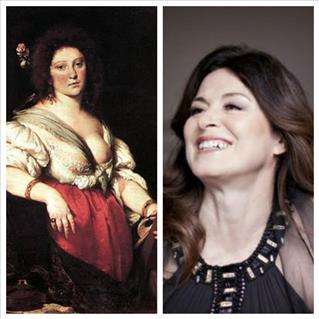|
Back
Emotions of a Bygone Era New York
11/14/2013
11/14/2013 -
“Era la notte” (“It was the night”)
Pietro Antonio Giramo: Lamento della pazza: Chi non mi conosce dirà (“Who does not know me will tell”)
Claudio Monteverdi: Lamento d’Arianna: Lasciatemi morire (“Let me die”) – Combattimento di Tancredi e Clorinda (“The Battle of Tancredi and Clorinda”)
Barbara Strozzi: Lagrime me, a che vi trattenete (“My tears that are held”)
Biagio Marini: Instrumental selections
Anna Caterina Antonacci (Soprano)
Soloists of the orchestra Les Siècles: Sébastien Richaud, Rachel Rowntree (violins), François Joubert-Caillet (viola da gamba), Julien Barre (cello), Christian Straude (contrabass), Manuel de Grante (theorbo), Johannes Keller (harpsichord)
Juliette Deschamps (Concept and director), Dominique Bruguière (Lighting design), Cécile Degos (Set design), Christian Lacroix (Costume design)

A. C. Antonacci (© Magalie Bouchet)
The first of two questions. What does one call the hour presentation last night (and tonight) of the florid highly dramatic soprano Anna Caterina Antonacci? Mozart and Beethoven would have called it a scena. Schoenberg would have named it a monodrama. Composers of the 18th Century would call it a pasticcio (though that is a demeaning title in today’s world).
Whatever you call it, Ms. Antonacci has the fireworks, the voice, and the very special music of the 17th Century to make this story of a lover, in all guises very endearing.
Then again, the Italian music of that century was made for one engrossing evening. For while French musicians wrote ballets dances for their Sun God, and while Bach and Teleman wrote for their churches and patrons, the Italians were already in the throes of the most highly emotional music of the Romantic period–with no holds barred!
They called it affetti, the music of emotions, cathartic music to excite, cleanse and totally involve their listeners. And while the aristocrats had the money to support them, the real joy of Monteverdi and his colleagues was in eschewing those niceties and going into the theaters of Venice or Naples and letting emotions pour out of them.
Ms. Antonacci had the right setting for it. A dark stage save for a trellis holding about 300 tapers radiating the stage until, as the hour was passing, they slowly extinguished themselves. That, along with an orchestra on stage right playing interludes by Biagio Marini, were the only stable props.
And they were all that was needed. as the soprano came out to play the kind of Mad Scene which makes Lucia’s hysteria seem like a nursery rhyme. Composer Pietro Antonio Giramo was a new name to me, but he obviously followed the Monteverdi model of letting the emotions hang loose, furious and fast. Ms. Antonacci pouted, swore, splashed madly two cans of water (real water, like real candles) all over the stage. Do people call her mad? Fine, she sung. Her madness was caused by love. And it really was insanity.
(The words almost literally came from Shakespeare’s sonnet, “My thoughts and my discourse as madmen's are, At random from the truth vainly express'd”)
This was woman as lunatic. With Monteverdi’s Lament, the music was on more familiar territory. The soprano is scorned now, her lover leaving her. She speaks of love, of revenge, her emotions are as wide and conflicting as any Italian stock character of the period.
Perhaps we can ridicule such emotions, yet Ms. Antonacci has the voice to make them come real. Her call to Thesus, “O Teseo, O Tesio Mio” had the pangs of desperation.

B. Strozzi, painted by Bernardo Strozzi/A. C. Antonacci
(© Gemäldegalerie, Dresden/Benjamin Ealovoga)
And now the second question of the evening: who is Barbara Str......er, notStreisand. Who is Barbara Strozzi?
One imagines 17th Century Venice to be one where men were rulers, women lovers or mothers. Yet Barbara Strozzi, the probable illegitimate daughter of a noted scholar, was herself composer, singer and string player, not only belonging to the intellectual coteries of Venice, but presiding over an otherwise all-male Academy of the Unisons. She must have been quite remarkable, worthy of a book in itself.
Perhaps Shakespeare’s Venetian lawyer, Portia, wasn’t so fictional after all.
Barbara Strozzi’s lament is that of a nobleman, whose beloved is imprisoned, a lovely piece both lyrically and dramatically. Again, Ms. Antonacci played with realism, the description of incarceration calling for an apparently live, and very well trained dove to come out on her hand, and later put into a little cage.
The finale was Monteverdi again, this the long, but never boring androgynous battle between First Crusade noble, Tancredi, and Persian lover, Clorinda, as told in a story by Torquato Tasso. I had seen this before, sometimes played with three singers (narrator and two heroes) and once with a pantomimed swordplay. Here, though Ms. Antonacci, with sword in hand, played all three roles.
This could have seen as overplaying, perhaps an affectation. Yet Monteverdi took this tale of a nighttime battle between the ex-lovers, neither recognizing the other, into a dramatic reality. We might call it today cartoon music, the orchestra imitating horse hooves, battle, religious conversion (the organ used for this!). But as complete cantata, it is one of the great pieces of the 17th Century, the literal encapsulation of Matthew Arnold’s metaphorical ”Where ignorant armies clash by night.”
Now the candles were mainly extinguished, dust came from above, and Ms. Antonacci was done with her theatrics. The hour went too quickly, the dramas were enticing, exciting yet never exhausting.
Yes, these were naked emotions, with more character than subtlety. Yet all that we love of Puccini, Menotti and some Verdi was augured in this music. Ms. Antonacci, her instrumental ensemble, and conception/director Juliette Deschamps came out for the usual bows. And we beheld in this aggregate of emotions, a world far more arousing in our own psyches than the more conventional work in the more genteel areas of Europe.
Harry Rolnick
|